How Much Does An ERP System Cost - Budgeting For Success
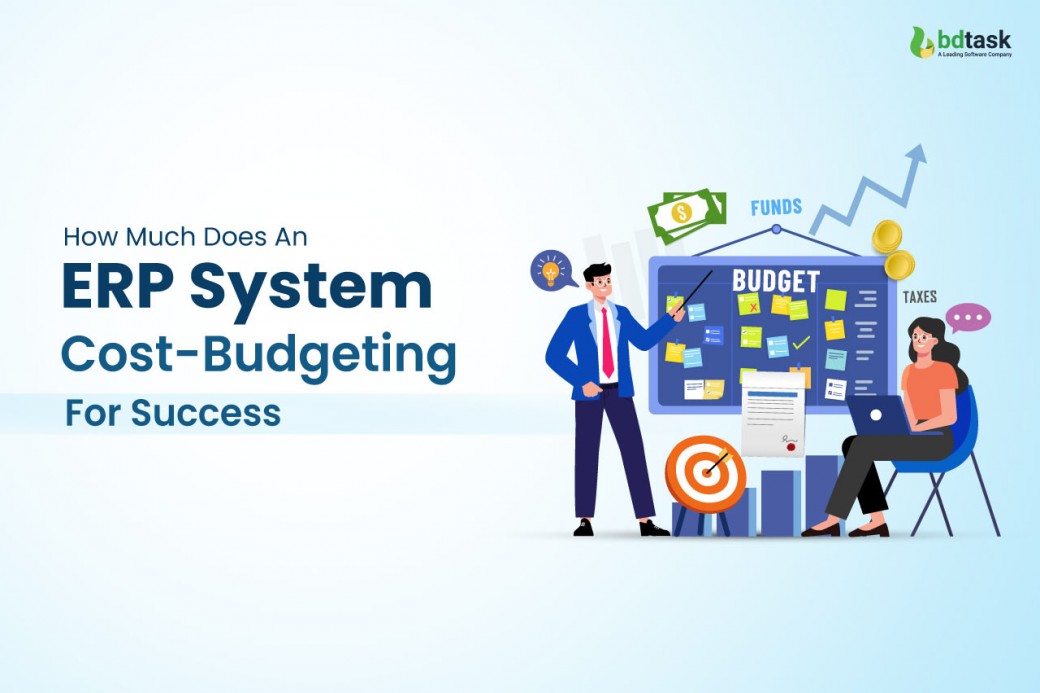
When implementing an ERP software solution, it is the priority to find how much does an ERP system costs.ERP system helps companies manage and integrate essential business functions and processes in one single system.
Manual monitoring and management of an organisation is challenging. Manually doing all the work is time-consuming and also errorful.
Before diving headfirst into implementing an ERP system, it's crucial to understand the costs involved.
ERP adaption and implementation might be costly. There are so many variables when selecting an ERP system. It could be hard to find the actual answer to how much does an ERP system cost. No worries! We are here to help. We want to guide you to find out how much does an ERP system cost.
What Is an ERP System?
Before discussing the cost considerations, it's essential to understand an ERP system.ERP system is a software application that lets an organisation manage and automate core business functions. Core business functions like
- Finance
- Human resources
- Supply chain
- Customer relationship management.
ERP system provides a centralised database, allowing real-time access to critical data, simplifying overall processes.
What Are The 3 Common Types Of ERP?
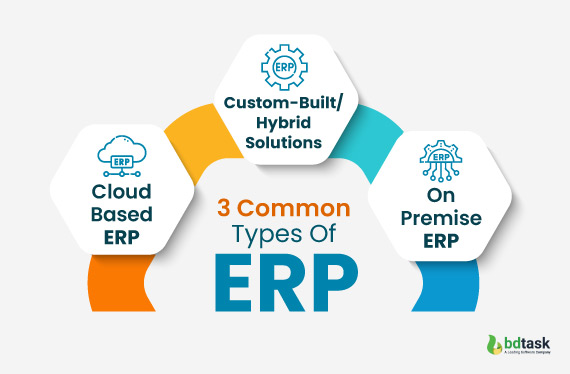
There are various types of ERP systems based on the size of the business, its applications, and the organisation's needs.ERP systems both have genetic and industry specifics.
Types of ERP software based on service patterns are:
- On-premise ERP
- Cloud-based ERP
- Custom-built/ Hybrid solutions
On-Premise ERP
On-premise ERP is directly installed on company hardware and servers. This ERP system gives us comprehensive control of the software in the company's hardware. The software is installed in a preferred data centre as per client needs. The installation process could be smoother.
- The company needs comprehensive control of the system and custom control of different modules as per requirement
- The price of this ERP system is based on the number of users, size, and other factors.
- A one-time upfront payment for an on-premise ERP software license is a potential investment.
- The financial liabilities may increase with periodical updates every 5 to 10 years.
Cloud-Based ERP
A cloud-based ERP is a new-age ERP system developed to minimise the hassles of the client. It can be accessed over the internet from the vendor's server, where it is hosted. Cloud-based ERP software operates from remote servers located on the cloud. It's a plus point for the company server because there is no additional load on the company's server.
Custom-Built/ Hybrid Solutions
It is a combination of both on-premises and cloud ERP. Custom-built ERP systems can be easily customised as per the customer's requirements.
It is easy to build new modules and integrate them as custom features in software or an existing one.
You must look for hybrid ERP providers when you need a combination of on-premises software integrated with exclusive cloud features like services, remote access, and storage.
Why Is ERP Costly?
ERP is costly, but it will depend on the set of
- Features and functionalities
- Integrations
- App design
On the other side, the hourly rates of developers also matter.UI/UX designers and QA involved in the ERP development project will also affect the final development cost of ERP software.
Is ERP expensive?
The estimated cost of an ERP software development will start from $35,000 to $200,000.
According to the information of Statista, the global ERP Software market is expected to grow higher. It's from USD 49 billion in 2023 to USD 62.3 billion by 2028.
Have you ever wondered how much does an ERP system costs? A report gathered by SoftwarePath in 2022 shows that the average ERP implementation cost starts at USD 9000.
But is it the same for every other type of business?
The answer is No.
When you take into account various other factors, the cost rises.
For a mid-level business- USD 150,000 and USD 750,000.
Benchmarking the budget requires looking into all the factors. Let's check what influences ERP system costs.
The Factors That Influence ERP System Costs?
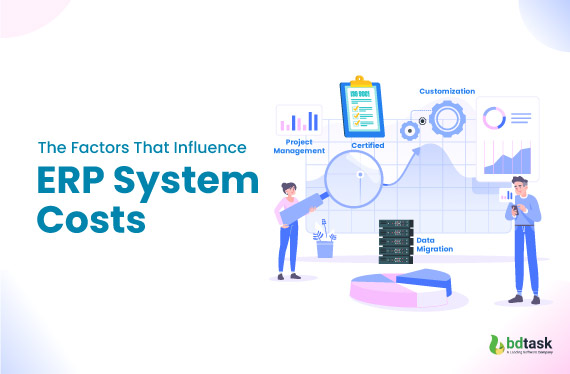
The cost of implementing an ERP system can differ significantly from one organisation to another. Several factors come into play when determining the overall cost. Here, we will break down these factors to give you a clearer picture of what to expect.
1. Scope Of The Project
The project's scope is the first factor that significantly influences the ERP budget. The extent to which an organisation intends to implement ERP modules directly correlates with the overall cost. A broader scope, which includes more modules and customisation, will naturally require a more substantial budget.
Scalability is equally important. Organisations should consider their future growth and whether the ERP system can adapt to evolving needs without excessive costs.
2. Software Licensing And Maintenance
ERP systems have licensing fees that vary based on the number of users and modules.
Ongoing maintenance and support costs are part and parcel of ERP ownership. Organisations must factor in these recurring expenses when budgeting for an ERP project.
Opting for cloud-based ERP solutions can alleviate some of these costs, as they often follow a subscription-based model.
3. Customization And Integration
Every organisation has unique processes and workflows that may need to align better with off-the-shelf ERP solutions.
Customisation and integration of ERP systems to meet specific business requirements can significantly impact the budget.
This includes the cost of hiring developers and consultants who specialise in ERP customisation.
4. Data Migration Cost
Migrating data from old systems to the new ERP platform is a substantial undertaking. The complexity of this task depends on the volume and quality of data, as well as the compatibility of systems. Data migration costs can escalate if not properly planned and executed.
5. Training And Change Management
ERP implementations significantly shift how employees carry out their daily tasks.
Training programs and change management strategies are essential to ensure a smooth transition.
Neglecting these aspects can lead to resistance, errors, and ultimately, increased costs.
6. Hardware Infrastructure
The hardware required to run an ERP system can be a substantial cost factor, especially for on-premises installations. Servers, storage, and networking equipment must be adequately sized and configured to support the ERP software efficiently.
7. Project Management
Efficient project management is crucial to keep the ERP implementation on track.
Experienced project managers, however, come at a price. They are pivotal in ensuring timelines are met and unexpected roadblocks are navigated without straining the budget.
How Much Does An ERP System Cost-Total Breakdown
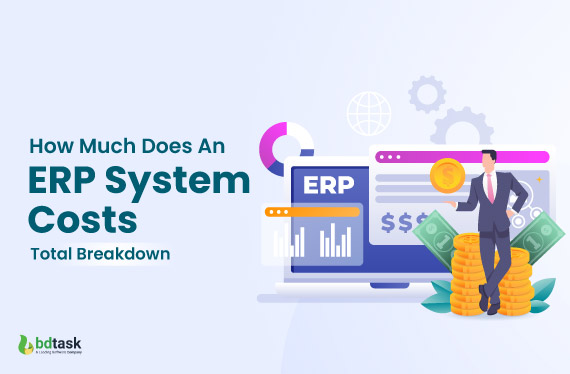
The final cost of implementing any ERP system in your company depends on multiple factors.
But one question pops up
how much does an ERP system cost?
Or
how much does it cost to implement an ERP system?
Here is the estimated cost of ERP system deployment based on company size and market range.
Small Business -($ 5,000 – $ 50,000)
Small – Medium Business-($ 50,000 – $ 500,000)
Medium Business – Enterprise-($ 500,000 – $ 2 million)
Most of the ERP cost will be spent on employees, external consultants, etc. Generally, the total ERP cost distribution looks like this:
- 15-30% go for the software itself
- 5-10% go for database and system management
- 10-20% go to the infrastructure
- 40-60% on human resources.
ERP systems have modules like
- Human resources management
- Inventory oversight
- Accounting
- customer service, and much more.
Only some businesses require the full spectrum of these modules. Remember that as you expand your feature set, you can optimise various aspects of your business. The cost of your ERP solution may surge.
For instance, Sage, a renowned ERP service provider, offers a suite of ERP solutions, including Sage HR, Accounting, and People, among others, tailored to cater to diverse business needs. Supplementary capabilities, such as Sales Apps and Data and analytics, are available at an extra cost.
1. Selecting The Right ERP Development Team
The cost of implementing an ERP system varies considerably among providers. Global Shop Solutions has a minimum ERP implementation cost of $25,000.
On the other hand, IFS Applications 10, designed for larger organisations, initiates at a starting $300,000.
2. Customization Considerations
The reality is that a ready-made ERP system may align differently with your unique business requirements. Customisation via additional plugins and third-party add-ons is necessary to bridge this gap.
In some cases, you may need to refactor the ERP codebase. However, it is only possible if it covers the provider's policies and the availability of an open-source code foundation.
Open-source Erp software price might be lower, as it does not require any licensing fees.
If you want to include some extra add-ons, the ERP provider's software might incur additional charges. There needs to be technical support to integrate these enhancements seamlessly.
Do you intend to refactor an open-source ERP software implementation?
It would be best if you had ERP software developers with skills in the technologies used in the ERP software.
The total cost of developers would depend on the one factor. The factor is a timeline of code refactoring.
If any businessman wants to make detailed customisations, the cost will increase.
You can hire a mid-level software developer from relatively cheaper countries.
Example :
Such as Eastern Europe, at an moderate rate of $50 an hour to customise your ERP code and meet your business requirements.
3. Deciding On Deployment
62.7% of companies use a cloud-based ERP solution for flexibility and scalability.
Choosing between an on-premise or cloud-based ERP solution is important.
On-premise ERPs charge higher upfront costs. On the other hand, the low costs of cloud ERPs make them more usable among small-to-medium-sized enterprises.
For example, Aquilon Software offers an on-premises ERP solution starting at $1,500 to $3,000 per user, depending on the selected modules.
Conversely, their cloud-based ERP solution commences from $75 per user to $150 per month.
ERP vendors typically provide two licensing models.
- Perpetual licensing for on-site deployments and
- Subscription-based pricing for cloud-based solutions.
The unchanging licensing includes one-time upfront fees that cost less over time.
4. Number of Users Matters
The number of users in your company would affect the final cost of the ERP system. You need to think about the expected number of users.
Because the price for an ERP quickly rises with an additional number of users.
For example, MRPeasy institutes an additional fee of $79 per month for every additional set of ten users.
5. Addressing Training and Support
To run the ERP system perfectly, you need to train your staff.
Training material, such as
- Tutorial videos
- Documentation
You can call it additional costs. It might be included in your pricing plan.
If you need any additional help, like an ERP expert coming to train your staff, it could cause you additional fees.
Similar to any software product, ERP solutions need regular software upgrades. It's essential to ascertain from your ERP vendor whether future upgrade support is included in the base price.
ERPNext, for example, bundles future security updates with its cloud deployment plan.
While initial technical support typically comes as part of the package, consistent, long-term customer support may entail additional costs.
6. Custom ERP Deployment
You should use a custom ERP solution if you have any business requirements. Like
- Regulatory requirement
- Complex business process
How much does an ERP system cost yearly?
Or
The annual cost of implementing an ERP system typically ranges between $15,000 and $35,000.
Custom ERP development would be a better choice for long-term cost efficiency. Custom software ERP solution gives more control. These benefits come at the cost of increased time and investment.
How long does it take to implement an ERP system?
- Small and medium-sized businesses need 3-9 months.
- Large businesses take 6-18 months.
- Multinational businesses need several years to implement.
Let's delve into the factors that underpin the cost of custom ERP development, ensuring you make an informed decision.
7. Let's check the ERP Development Team
You need to maintain qualified professionals to control all the processes successfully.
- A project manager guiding the development process from planning to deployment over a minimum of three months, with an average hourly rate of $40.
- Two backend developers, working full-time for at least three months, each commanding an average hourly rate of $40.
- A front-end developer, dedicated full-time for at least three months, at an average hourly rate of $35.
- A UI/UX designer contributes for at least one month at an average hourly rate of $30.
- An ETL (Extract, Transform, Load) expert, managing data migration and verification for at least two months, with an average hourly rate of $40.
- A full-time QA (Quality Assurance) engineer, ensuring the solution's integrity over at least two months, commanding an average hourly rate of $30.
The total development time and cost depend on the complexity of your ERP modules and design.
Remember, you can get freelance developers at a relatively low price when seeking developers.
Complex ERP projects are often senior, seasoned developers with expertise in diverse software architectures and development methodologies.
8. ERP Development Stages
ERP development stages give a better outline of the time required and the associated cost to finish an ERP implementation project.
ERP software development life cycle has the following steps:
- Planning and Requirement Analysis requires an average of 2 weeks.
- The design takes three weeks on average
- ERP Development time is 4 to 20 weeks on average.
- Testing is a comprehensive stage. It will take 1 to 3 months to complete.
- Deployment takes three weeks on average.
9. Downtime and Disruptions
ERP implementation often results in downtime and disruptions to daily operations. This downtime can impact productivity and, subsequently, revenue. It's essential to factor in the financial implications of potential disruptions when planning for ERP implementation.
10. Maintenance and Support
ERP systems require continuous maintenance and support to ensure optimal performance and security. Budgeting for regular updates, patches, and technical support is essential. These aspects must be revised to avoid higher long-term costs due to system vulnerabilities and inefficiencies.
Maintenance costs for an ERP system generally vary between 15–20% of the initial purchase price. An ERP set-up that costs $250,000 would carry, in theory, a maintenance cost of $37,500 to $50,000.
Are ERP Systems Worth The Costs?
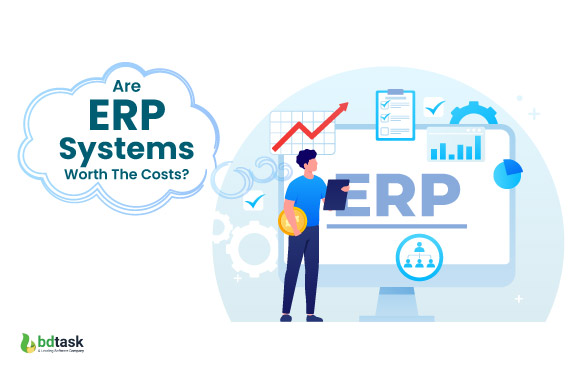
A good ERP application brings real-time access to an integrated unified database of processes for everyone in a company. let's check the ERP system cost-benefit analysis in down below.
- Efficiency – A winning feature that changes the game of your business. It will help you to reduce the reducing manual and repetitive tasks.
- Cost-saving – It's also not less important, with exact data reducing operating costs and preventing delays/disruptions.
- Security – confidentiality and safe data with options to restrict access to various layers of information.
- Customer service – Better and fast communication with clients, consistent and full information, transaction history, etc.
- Mobility – Easy access to a centralised program from any time and anywhere.
- Reporting –Options to customise reports and overall visualisation of complex data.
- Forecasting – Forecasting is pretty much easy based on your accurate data and transactions.
- Flexibility & scalability – Control all your modules as you wish and add more over time, tailoring all the elements.
- Automation – Saving time and costs by automating human tasks.
With all those advantages put together properly, your company will gain an edge over other market players.
Ready To Select An ERP Solution For Your Organization
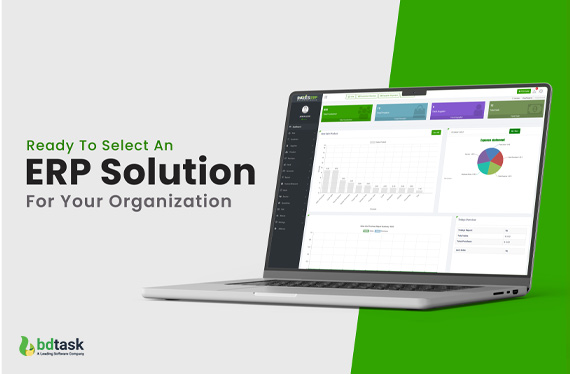
No one can say how much does an ERP system cost. Any vendor can tell you their pricing policy and possible additional costs. You can estimate your budget accurately if you know your infrastructure, staff, and software needs.
The main point is that you’ll know the total cost only when the project is complete.
The common rule is that the bigger the company, the bigger the number of users, and the higher the cost.
How to choose best Erp software for small business?
Or
Any ERP software that is easy to use and user-friendly.
Or
Suggest ERP system for midsize companies
If you need a feature-rich, scalable, and secure ERP system for your enterprise sales ERP is the best option for you. You can customise it to your requirements with the help of our software developer at a cheaper price. Sales ERP is a cost-effective erp system for small business.
Conclusion
Implementing an ERP system can be a transformative step for your business. but it's essential to understand how much does an ERP system cost. By carefully viewing the factors mentioned in this article and choosing the right ERP system for your needs. You can make a well-informed decision to help your organisation in the long run.










